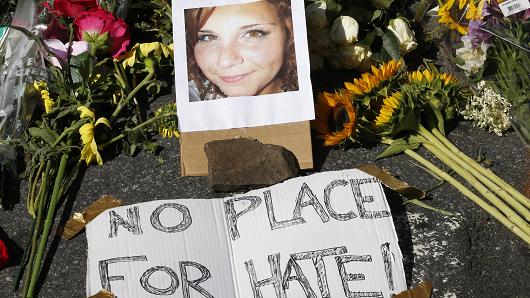Every now and again, I chime in on current events, mostly social justice issues. I write stories that are not overtly politcal or educational, but I’m always aware of the two-way connection between literature (culture) and politics. Literature can deepen understanding of cultural diversity, or strengthen, even create harmful beliefs and attitudes. Beyond that, I’ve always cared a lot about social justice, in part because of my upbringing and later when I confronted stigma and prejudice quite personally as a gay man. Though my platform as an author is small, I’ll gladly use it to denounce bigotry and boost the signal of individuals and groups who are fighting the good fight.
There’s a lot to say about the White Nationalist “Unite the Right” rally, the deadly violence, and the counter-protest that happened in Charlottesville, Virginia last weekend. As the country moves forward by removing statues of “confederate heroes” that were installed across the South as symbols of white supremacy, a response to black progress in the Reconstruction Era and de-segregation in the 1950s and 1960s, it is sad though not surprising we are witnessing a backlash from whites. We don’t have to look to archived, black and white photos, grainy camera reel from a much earlier era, to see what mobs of White Nationalists look like. Their images – carrying torches, rifles, ugly placards – their sounds – reclaiming America, they’re everywhere in social media and daily newscasts, and a frightening reminder that social change does not come easily.
There’s also a lot to say about President Trump’s incitement of white nationalism during his campaign and continuing through his presidency. His speeches have been polluted with racist propaganda, sometimes remarkably overt in the case of his defamation of Mexicans, his calls for violence against media outlets and his political rivals, which dare to characterize him as racist. His slogan: Make America Great Again, is easily decoded as: Make America White Again, by both his supporters and his opponents. He foments distrust, fear, hatred of brown-skinned foreigners, Muslims in particular, with fake news narratives about the threat to white American safety.
Trump’s reaction to the “Unite the Right” rally in Charlottesville and the anti-racist protestors who bravely met them there (bad behavior “on both sides”) shows once again whose interests he represents. He defends the cause of preserving confederate statues, says the anti-racist, anti-fascist counterprotestors had no right being there, suggests they got what they deserved. It is not acceptable. The Resistance must fight even harder to oppose what I call an anti-human agenda because it encompasses so much, is targeted so widely: anti-black, anti-Hispanic, anti-immigrant, anti-Muslim, anti-transgender, anti-women, anti-poor, among others.
All of these things are important to talk about, and what’s on my mind the most are the courageous counter-protestors, one of whom Heather Heyer made the ultimate sacrifice. Those counter-protestors were black and white, and mostly white according to participants. That’s likely due to many factors such as the composition of the college town and the privilege of white folks to protest without the fear of police brutality (at least a lessened fear, without historical precedent). White anti-racist activists are no more righteous than black anti-racist activists, and by elevating their courage, their herocism, I mean in no way to suggest that, or to move focus away from the core of the “Unite the Right’s” intention, which was to terrorize people of color, to “put them in their place.”
Movements need allies, and that’s exactly who Heather Heyer was, an anti-racism ally. I hear this discussion a lot from friends and colleagues who are people of color. It’s time for white people to stand up, take responsibility for racism in our own community. Anti-racist work is hard. It’s sometimes deadly. Black people cannot do it on their own, nor can Muslim-Americans, nor transgender people. At times like this, I evaluate myself as an ally. I talk the talk, but do I walk the walk as much as I could? I confront racism when I hear it spoken, most recently in conversation with the owner of a newstand (which also led to deciding to buy my midday soda and snack at a different newstand). I have participated in Black Lives Matter protests and helped students use photography to promote anti-racist messages. I could do more. There’s no question about it.
This is one thing I had to do today: to honor Heather Heyer along with all of the counter-protestors from Charlottesville. They are national heroes.

Retrieved from cnbc.com
